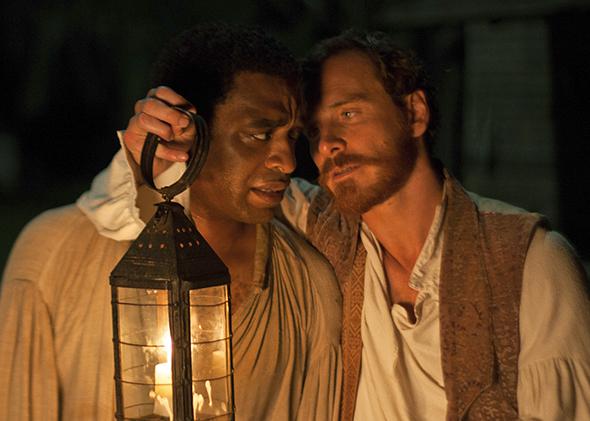Dear all,
Last night, on less than four hours of sleep in a Park City, Utah, hotel room, I rewatched 12 Years a Slave—or at least as much of it as I could get through, because Lord, that movie takes it out of you—in the hopes of getting a little closer to being able to explain (and understand myself) why Steve McQueen’s film, despite its many and real virtues, failed to make my 10-best list of the year. Stephanie, your reservations about 12 Years a Slave (which you also didn’t put on your list) seemed to come primarily from what you see as the film’s burnished tastefulness, the aesthetic beauty with which McQueen depicts moral horror. (Is that a fair one-sentence summation of the concerns you express in your review?) I can certainly see that objection; there’s a painterliness to McQueen’s compositions—all that Spanish moss reflected in shimmering bayous—that sometimes threatens to muffle the film’s raw human drama. But my problems with 12 Years lie elsewhere—and the place where they lie is an upsetting and confusing place to go, which is no doubt the reason our discussion of 12 Years has taken all week to get underway.
McQueen’s film is a document of suffering that explicitly aims to make the viewer suffer as well—an artistic strategy McQueen also deployed in his previous two films, Hunger and Shame, both of which starred Michael Fassbender as a man mortifying his own body (in the first case, as an Irish hunger-striker starving himself to death; in the second, as a Manhattan sex addict trying, it sometimes seemed, to fuck himself to death). In 12 Years, the stakes are higher: not just the fate of one handsome white guy’s body, but of a multitude of black bodies through centuries of American history. And because of those increased historical stakes, McQueen ramps up the scale and the intensity of the suffering he aims to both depict and cause.
I guess, simply put, I’m just not sure I’m down with body horror as a directorial approach for a movie on this subject. After a certain point it seems to serve more to shut out (and gross out) the audience than to make them think, feel, and engage. I did love nearly every scene in 12 Years a Slave that takes place among the slaves, in their world: when Patsey (Lupita Nyong’o) begs Chiwetel Ejiofor’s Solomon to do her the mercy of taking her out and drowning her, it’s a moment of sheer moral (not physical) agony, perfectly played by two fearless actors. And the memorably sinister scene in which Patsey, a field worker, sits down for an uncomfortable afternoon tea with a house slave turned kept mistress played by Alfre Woodard points at a different movie McQueen might have made, one about the hierarchies; rivalries; and tenuous, wary friendships among the enslaved characters themselves.
But when the white overseers and masters—particularly Fassbender’s red-bearded supervillain, but to a lesser degree the figures played by Paul Dano, Paul Giamatti, and Benedict Cumberbatch—show up, there’s sometimes the hint of a prurient horror-movie vibe that can feel exploitive. I felt this when Dano’s rather theatrically vile character sang that hideous “Run, nigger, run” song in close-up. Or in the many scenes when Fassbender (who, on a second viewing, I find to be laying it on a little thick) wanders his plantation with a bottle in hand, circling like a predator, looking for someone to humiliate and abuse. Last week’s painful dustup at the New York Film Critics Circle aside, I think there’s a grain of truth in Armond White’s characterization of 12 Years in his original review as relating to the genre of “torture porn” (though I disagree that McQueen’s purpose in using this approach is “to make white people feel good about their own guilt.”)
Still, that last scene of Solomon Northup finally reuniting with his family in the North has a grand, elemental simplicity. Watching that ending in a packed theater with an audience that was, almost to a person, crying, felt like a welcome if painfully incomplete catharsis, one that was maybe only reachable after the cinematic crucible we had all been through together.
And with those lighthearted observations, the conversation grinds to a halt for a moment, and the forks can be heard clinking in the cavernous banquet hall. Andrew, care to pick up the thread? No need to wallow in moral degradation with Michael Fassbender (unless, of course, that’s your thing). You can talk about … let’s see … how unexpectedly great Daniel Brühl was as a resentful race-car driver in Ron Howard’s Formula One biopic Rush. Or how Edgar Wright’s tender pub-crawl comedy The World’s End did double duty as a powerful parable about addiction and middle-aged friendship. Or the world-historical import of Amy Adams’ side boob. Just please get out your vaudevillian shepherd’s crook and haul me off the stage.
Missing you guys already,
Dana
